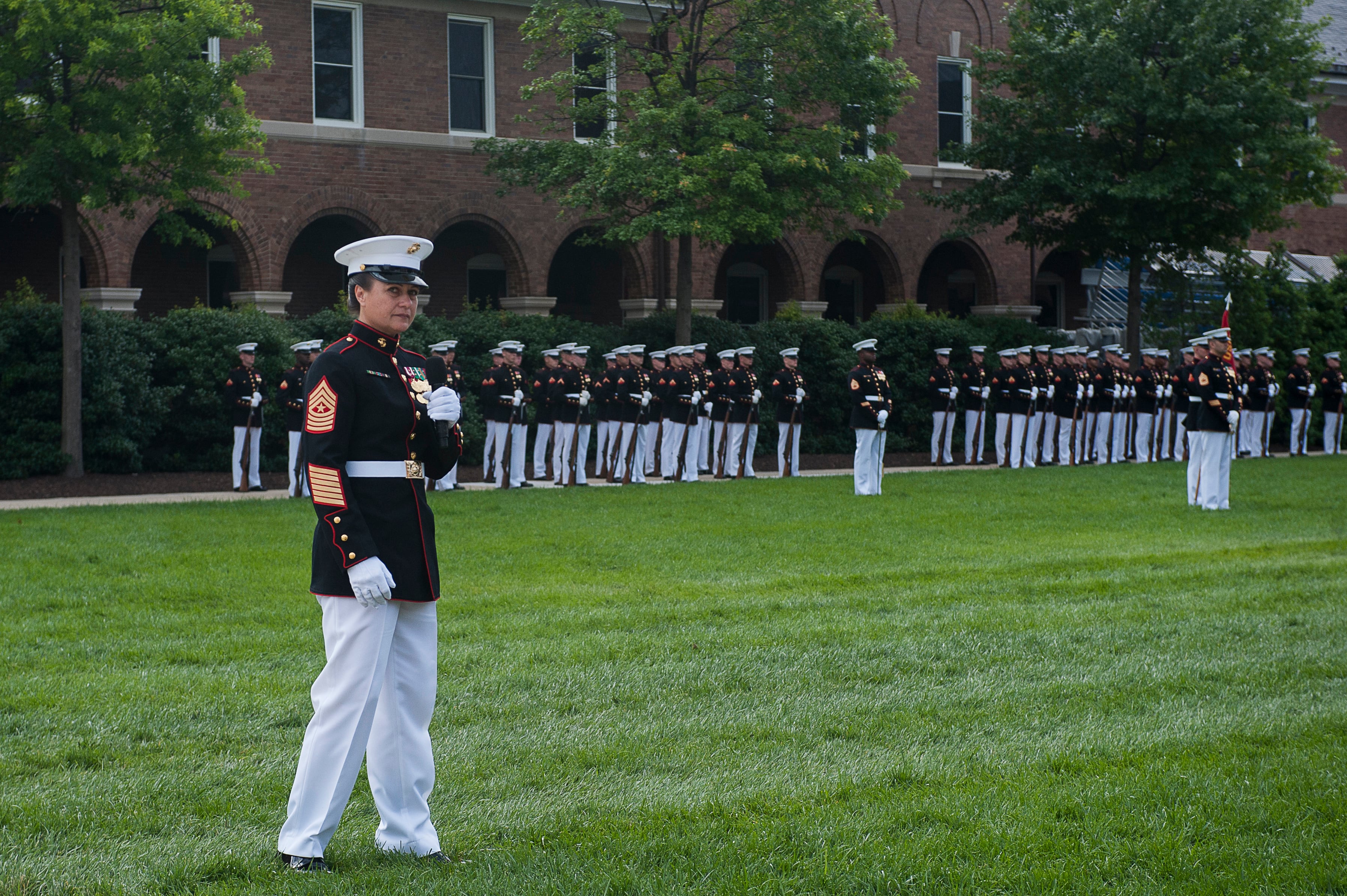When Navy Secretary Ray Mabus sent a memo to the Marine Corps commandant, ordering him to develop a plan for gender-integrated boot camp, Gen. Robert Neller reportedly became irate.
Officials familiar with the events told the Associated Press that Neller quickly requested a one-on-one meeting with Defense Secretary Ash Carter to discuss the matter. The scuffle is just the latest example of friction between the SecNav and top brass.
Mabus, who has led the Navy Department since May 2009, has transformed the sea services during his tenure, the longest of a Navy secretary in a century.
The former Navy lieutenant j.g. has pushed forward his often controversial vision on gender, personnel policies, even the nitty-gritty details on officer promotions and sailor and Marine uniforms.
Here's a look at some issues that will shape the secretary's legacy.
Women in combat
Mabus, 67, a Harvard-trained lawyer and former Mississippi governor, campaigned for then-presidential candidate Barack Obama in his home state. Marines have long complained that he is more interested in carrying out the Obama administration's "social engineering" policies than leading the sea services through serious challenges.
Exhibit A is the ongoing feud over allowing women to join Marine ground combat specialties, a move that many former Marine leaders say will weaken the Corps' legendary combat effectiveness.

Navy Secretary Ray Mabus called the Marine Corps' months-long study on gender integration flawed.
Photo Credit: Cpl. Maricela Veliz/Marine Corps
Mabus insists that opening these jobs to qualified women promotes fairness, allows women to compete for promotion on an equal footing, and allows the Corps to recruit a much larger portion of the nation's graduates and workforce. But the move met strident opposition.
Then-Commandant Gen. Joseph Dunford recommended in late 2015 that Marine ground combat units remain closed to women, citing a lengthy study that found women underperformed and were more likely to be injured.
In an interview with NPR, Mabus decried the study as flawed and asserted that most men involved had already decided it wasn't a good idea.
An influential sergeant major who oversaw the study said Mabus' comments were "way off base."
Mabus prevailed, and on Dec. 3, Carter announced that all four services would open every specialty to women.
Co-ed boot camp
After Carter's announcement, each of the services were given until Jan. 1 to present a plan for how they will open previously closed positions to women, using "existing recruiting, accession, training and assignment procedures."
The day that report was due, Mabus sent two memos to the Marine commandant. The first instructed him to present, by Jan. 15, a "detailed plan" on how the service will fully integrate its boot camp and Officer Candidates School. The plan would be implemented by April 1, the memo states.
"The Department of the Navy's implementation plan must include gender integration of Marine Corps enlisted recruit training and officer candidate school," Mabus wrote. "In this submission, identify where, if anywhere, this training is already integrated, where it is separate, and specific steps that you will take to fully integrate these trainings."
The Corps has long touted the benefits of its segregated training, which allows female drill instructors to intensely mentor the women in their charge. Marine leaders don't want to change, AP reported, and need to fully understand the implications of making such a change.
Sources told Marine Corps Times on Friday that it's unlikely that Marine boot camp will go fully coed, though Corps officials could look for ways to further integrate some of its entry-level training.
Renaming MOSs
In a second Jan. 1 memo from Mabus to Neller, the SecNav directed the Marine Corps to conduct a full review of its military occupational specialty titles in an effort to ensure they are gender neutral.

Navy Secretary Ray Mabus instructed the Navy and Marine Corps to review military occupational specialty titles that include the word "man" in an effort to make them more gender neutral. Whether iconic titles like infantryman and midshipman will change remains to be seen.
Photo Credit: Cpl. Orrin G. Farmer/Marine Corps
"As we achieve full integration of the force ... this is an opportunity to update the position titles and descriptions themselves to demonstrate through this language that women are included in these MOSs," Mabus wrote, giving them an April 1 deadline.
A Navy official said Mabus doesn't intend to require iconic titles like "infantryman," "rifleman" or midshipman to be changed, however.
"The idea is not to go in there and change the name when 'man' is incorporated as part of the term," said the official, who spoke on the condition of anonymity. "... But when the word 'man' appears as a separate word ... they want that name to be changed."
New directions
Mabus has pushed for some of the biggest personnel policy changes across the Navy and Marine Corps.

New rules set maternity leave at 12 weeks for all new moms. Here, Marine Sgt. Angela Polsky holds her son after returning in 2011 from her deployment in Afghanistan.
Photo Credit: Cpl. Preston Reed/Marine Corps
In 2013, the Navy Department began a big crackdown against one of its foremost challenges: alcohol abuse. Sailors and Marines were ordered to randomly perform breath tests at their commands, starting in 2013, which officials called a nonpunitive move to deter alcohol abuse and assist those suffering through it.
Many have found the tests patronizing, but the services haven't backed off.
More recently, the SecNav focused on big changes to the rules that govern Marines and sailors' careers.
In a May speech at the Naval Academy, he unveiled far-reaching reforms like recruiting more women, overhauling the officer promotion system and expanding career intermission and maternity leave programs.
Mabus tripled leave for new Navy and Marine moms to 18 weeks, well ahead of the other services, and extended child care hours. These efforts were aimed to persuade more women to stay in for a career.
"We were just losing way too many women, twice as many women as men in the three- to seven-year mark," Mabus said in the speech.
It remains to be seen how well these improved perks will work. Some women still feel the bureaucracy disadvantages women who are starting families.
"The younger generation [of women] are like, it's just not worth it for me to stay in," an O-5 helicopter pilot, who asked not to be named, said in November. "If I want to start a family, I'm never going to make rank, I'm never going to be treated the same."
Mabus also revamped the Navy and Marine Corp's year-group promotion process for officers, so that zone distinctions will no longer play a role in the selection process. The aim is to give good performers who haven't hit every mark on the golden path more than two chances to move up.
For those looking for a more flexible career track, Mabus announced expanded in-residence graduate school opportunities, more spots in the career intermission program, and a chance for top-performing junior officers to take three years off and spend them at a Fortune 500 company.
While the options sounded good, not everyone was sold. There are few takers for the up-to-three year career intermission program and some mid-career officers worry that, despite assurances, veering off the path could affect their promotions.
Looking like Marines
Mabus has been the driving force behind gender-neutral uniforms, an idea sparked at the 2009 Army-Navy game.
"The cadets marched out in absolutely gender-neutral uniforms. Mids marched out and you could tell what the women wore by their covers," he recalled.
Marines were embarrassed the service briefly considered a gender-neutral cover, dubbed a "girly hat," that resembled one worn by women.
But the SecNav has been resolute in his determination to outfit men and women in the same style uniforms and symbolically break down barriers that have stood for decades. Critics argued that making female Marines dress like men actually would run counter to the military's off-stated goal of boosting diversity, that while their contributions were welcome, their femininity was not.

Sgt. Maj. Angela Maness, Marine Barracks Washington's sergeant major, wears the unisex dress blues uniform. Navy Secretary Ray Mabus wanted all Marines to look the same in their uniform regardless of gender.
Photo Credit: Cpl. Mondo Lescaud/Marine Corps
Marines adopted a unisex (but male-style) cover and then, after years of wear tests, Neller in January approved a move to have female Marines wear a modified version of a men's dress coat over the next couple of years.
No plans to retire
In six years, Mabus has served under four defense secretaries and with multiple chiefs of naval operations and commandants.
It's remarkable that he's still able to effect change after all that time, said Lawrence Korb, an assistant defense secretary for manpower, reserve affairs, installations and logistics under President Ronald Reagan.
"It's interesting that he stayed this long, because everybody tells me that he wanted to be secretary of energy," he said. "I'm sure he figured that this would be a stepping stone to something else. I doubt he thought he'd stay there the whole eight years, and now that'll give him some place in history."

Ray Mabus is the longest-serving Navy secretary in a century. He says he has no plans to retire.
Photo Credit: MCC Sam Shavers/Navy
The security of his legacy hinges on who replaces him.
"It depends upon whether you get someone who comes in there really wanting to exercise the power of the office, or somebody who thinks that, 'Hey, this is a great reward for me, for what I did in the campaign,'" Korb said.
With just over a year left in the job, Mabus said he has no plans to retire.
"Past that, I haven't thought much about it," he said. "This is an astoundingly good job. I love this job."
Meghann Myers is the Pentagon bureau chief at Military Times. She covers operations, policy, personnel, leadership and other issues affecting service members.




